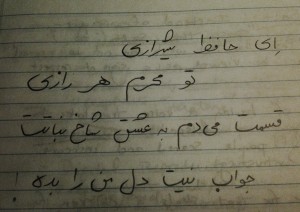 Oh, Hafez from Shiraz, you are the keeper of all secrets. By the devotion that you have to your lover, I beseech you to answer my wish.
Oh, Hafez from Shiraz, you are the keeper of all secrets. By the devotion that you have to your lover, I beseech you to answer my wish.
Hafez was a Persian poet, and his work has become extremely influential in Persian culture. Although it is authored work, his poems and sayings have become a part of the daily lives of Persian people, becoming almost like folklore. The ways in which his work is now used is particularly striking, and these uses have become folkloric in that they are ritualized and have become traditional. Many Persians will recite the Call to Hafez out loud, express a wish or desire, or even ask a question in their mind, and then open to a random page of poetry in the collection, Odes of Hafez. The performer will then read the poem and interpret its meaning, which they view as an answer or response to the desire or question they expressed. The informant made it very clear that this tradition has existed for several generations, as she remembers her father doing it with his friends when they lived in Iran. Furthermore, she made it very clear that this tradition cannot be distinguished by social or economic status either, and is a tradition practiced by all kinds of people. I found it particularly interesting when the informant insisted that I perform this tradition and ask Hafez a question. After asking a question and opening to a page, the informant became very excited and read the poem aloud, asking if it provided any insight into the question I asked. After stating that I was unsure, I revealed that I asked Hafez if I would be able to find employment after college. According to her analysis of the poem, my future is optimistic. Her excitement at not only performing this tradition herself, but also in sharing it with me, exemplified its role as a social activity, or game, that is fun and entertaining. It also exemplifies that people of all cultures have long tried to predict their futures and fortunes, often through astrology or entertaining traditions like this one.
Book of poems used: Odes of Hafiz: Poetical Horoscope (translated by Abbas Aryanpur Kashani)
